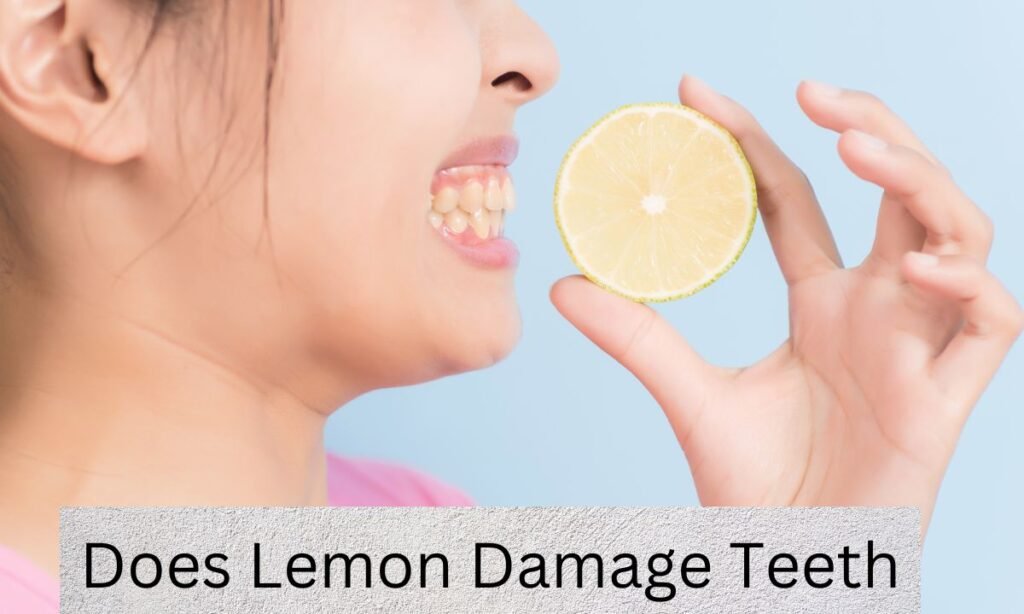Lemons are widely known for their tangy flavor and health benefits, but many people wonder: Does lemon damage teeth? The acidity in lemons can indeed have implications for your oral health. This guide will delve into how lemons can affect your teeth, what you can do to mitigate any potential damage, and how to balance enjoying lemons with maintaining your dental health.
The Acidic Nature of Lemons

Lemon Composition and Acidity
Lemons are rich in citric acid, a compound responsible for their sharp, sour taste. This acid has a pH level ranging from 2.0 to 3.0, making lemons highly acidic. Here’s how this acidity impacts your teeth:
- Enamel Erosion: Enamel is the hard, protective outer layer of your teeth. Citric acid from lemons can erode enamel by dissolving the minerals that make it strong. Over time, this erosion can lead to increased sensitivity and a higher risk of cavities.
- Scientific Evidence: Research published in the Journal of Dentistry highlights that regular exposure to citric acid can lead to significant enamel erosion. The study showed enamel loss of about 30% after several months of consistent citric acid exposure.
The Role of Acid in Oral Health
Acids can lower the pH level in your mouth, creating an environment where enamel demineralization occurs. When the pH drops below 5.5, enamel starts to lose its minerals, which weakens it and makes teeth more prone to decay.
Specific Effects of Lemon on Teeth
1. Enamel Erosion
- What It Is: Enamel erosion is the gradual loss of the tooth’s outer layer due to acid exposure. Lemons contribute to this process by consistently lowering the pH level in your mouth.
- Consequences: As enamel wears away, teeth become more susceptible to cavities, and the dentin layer underneath becomes exposed, which can lead to increased sensitivity.
- How It Happens: When enamel is eroded, the dentin beneath it, which contains nerve endings, is exposed. This exposure can cause sensitivity to temperature changes and certain foods.
- Relief Tips:
- Desensitizing Toothpaste: Products containing potassium nitrate or strontium chloride can help block nerve signals and reduce sensitivity.
- Fluoride Treatments: Regular fluoride use can strengthen enamel and help protect against further erosion.
3. Staining
- Explanation: Although lemons themselves aren’t the primary cause of staining, eroded enamel can make teeth more vulnerable to discoloration from other foods and drinks.
Visual Aids: Diagrams illustrating enamel erosion and sensitivity can help clarify how acidic exposure impacts dental health.
Factors Influencing Lemon’s Impact on Teeth
1. Frequency of Consumption
- Impact of Regular Use: Consuming lemon juice daily can accelerate enamel erosion. Moderation is key to reducing the risk of damage.
2. Concentration of Lemon Juice
- Fresh Juice vs. Store-Bought Lemonades: Fresh lemon juice is more acidic than many store-bought lemonades, which often have added sugars and less acidity. Diluting lemon juice with water can minimize its erosive effects.
3. Oral Hygiene Practices
- Importance: Maintaining good oral hygiene helps mitigate the effects of acidic foods. Rinsing your mouth with water after consuming lemon can help neutralize acids and wash away residues.
4. Lemon Water Myth
- Debunking Misconceptions: Lemon water, even though diluted, still contains citric acid. Proper dilution and consumption in moderation are essential to protect your teeth.
Minimizing Lemon’s Damage
Practical Tips
- Dilute Lemon Juice: Mix lemon juice with water to reduce its acidity and lessen its impact on enamel.
- Use a Straw: Drinking acidic beverages through a straw can minimize contact with your teeth.
- Rinse Your Mouth: After consuming lemon, rinse with water to neutralize acids and remove any remaining residue.
- Wait Before Brushing: Allow at least 30 minutes before brushing your teeth to prevent brushing away softened enamel.
- Regular Dental Check-ups: Schedule regular visits with your dentist to monitor enamel health and receive personalized advice.
Alternative Options: Consider using less acidic fruits or flavorings in your diet to reduce enamel wear.
Benefits of Lemon and Balancing Risks
Drinking lemon water offers both health benefits and potential risks. As explained by Vince Lia on YouTube Video below (19 Mar 2018), it can boost hydration, aid digestion, and provide vitamin C. However, the acidity may erode tooth enamel over time, so it’s best enjoyed in moderation and followed by rinsing with plain water.
Lemons offer several health benefits, including high vitamin C content, antioxidants, and digestive aid. To enjoy these benefits while protecting your teeth:
- Moderation: Consume lemons in moderation and follow the tips provided to minimize their impact on your dental health.
- Consult a Dentist: For tailored advice and solutions based on your oral health, consult with your dentist.
FAQ
1. Can I brush my teeth after drinking lemon water?
It’s best to wait at least 30 minutes after consuming lemon water before brushing your teeth. Brushing immediately can damage softened enamel.
2. Is lemon bad for teeth veneers?
Lemon can potentially affect the underlying tooth structure of veneers. Consult your dentist for specific care instructions if you have veneers.
Conclusion
Lemons, with their rich vitamin C content and health benefits, can pose risks to your dental health due to their high acidity. Enamel erosion, tooth sensitivity, and potential staining are significant concerns. By following practical tips for minimizing damage and maintaining good oral hygiene, you can enjoy lemons while protecting your smile.
Take action today to safeguard your oral health. Schedule a dental check-up and share this information with friends and family to help them maintain their dental health while enjoying the benefits of lemons!
Find Your Perfect Dentist
Easily book appointments with top-rated dentists in your area
Need Emergency Dental Care?
Get immediate help from verified dental professionals